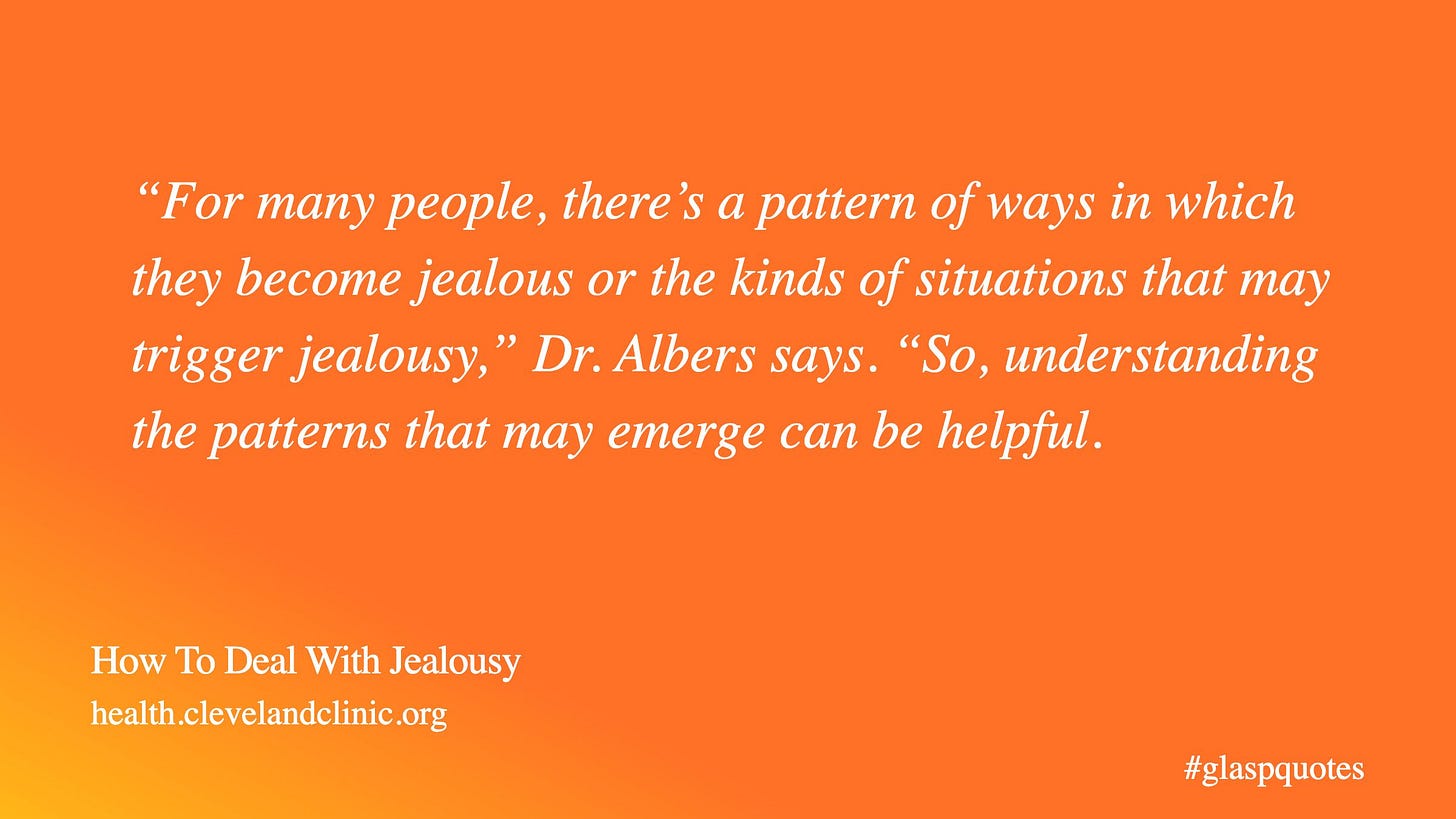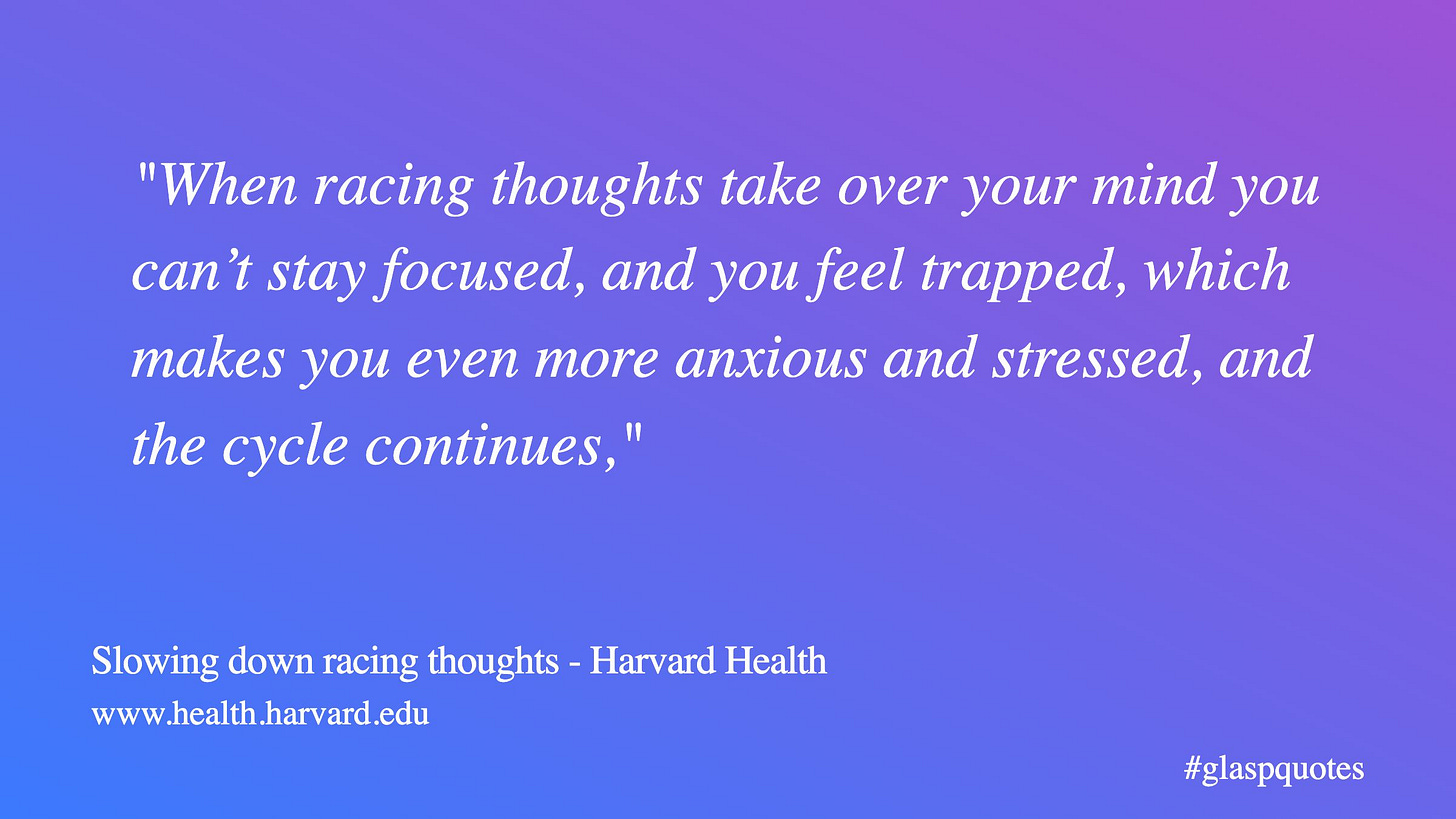Health Highlight: Mon. 3, Apr.
Today’s highlights: A research study about trauma and long-term mental health; a quick look at the feeling of jealousy; and what to do about racing thoughts.
Health Highlights workflow is powered by Glasp.co & Neeva
🧠 Learn, ❤️ Like, 🤝 Share, and 📩 Subscribe
1. “Brain Activity Patterns After Trauma May Predict Long-Term Mental Health” (URL, Glasp)
✍🏼 NIMH Staff Writer(s) • 🗞️ NIHM, Science News • 🗣️ @NIMHgov
BRIEF
According to study results supported by the National Institute of Mental Health, a person's long-term mental health may be predicable from how their brain reacts following a traumatic event, such as a car accident.
“Two weeks after the accident, the participants had their brain activity measured via functional MRI while they completed a series of standard computer-based tasks. The tasks assessed their brain activity in response to social threat cues, reward cues, and situations that required them to inhibit a response.” 1
The study found that people with high activity related to both threat and reward had more post-traumatic stress disorder (PTSD) and anxiety symptoms than people with other profiles.
The researchers think that future studies should pay more attention to reward reactivity as a possible risk factor for stress-related symptoms after trauma.
These are early results, and these brain-based profiles will need to be confirmed and improved by more research with larger samples.
🏷️ Tags: #PTSD #Trauma #MentalHealth #NIMH2. “Here’s Where Jealousy Comes From (and 3 Ways To Tame It)” (URL, Glasp)
✍🏼 Cleveland Clinic Writer(s) • 🗞️ Health Essentials • 🗣️ @ClevelandClinic
SUMMARY
Insecurity, anxiety, trauma, or personality traits can all cause the natural emotion of jealousy to arise. It can lead to a negative self-image and feelings of shame.
“For many people, the true root of jealousy is insecurity,” says Dr. Albers. “And being able to pinpoint what is pushing on that insecurity is enlightening and illuminating about not only yourself, but also the relationships.” 2
Recognizing internal triggers and communicating with the person involved can assist in dealing with jealousy.
Jealousy is not limited to romantic relationships; it can affect any type of relationship.
Seeking assistance from a therapist or relationship counselor can also be advantageous.
🏷️ Tags: #HeyJealousy #MentalHealth #InterpersonalRelationships #ClevelandClinic3. “Slowing down racing thoughts: Calming and refocusing when anxious or negative thoughts surge through your mind.” (URL, Glasp)
✍🏼 Matthew Solan • 🗞️ Harvard Health • 🗣️ @HarvardHealth
SUMMARY
Anxiety and stress can be caused by racing thoughts, but there are ways to manage them. Allowing yourself to experience them and accepting that they are just noise can help.
Practicing mindfulness and diverting your attention with activities such as exercise, reading, or listening to music can also be beneficial.
Scheduling worry time and confronting your anxiety head-on can be beneficial, but if racing thoughts disrupt your life or sleep on a regular basis, you may need to seek help from a doctor or mental health professional.
“Frequent racing thoughts may be related to anxiety disorders, attention deficit hyperactivity disorder (ADHD), obsessive compulsive disorder (OCD), trauma, or other mental health issues that need exploring,” 3
🏷️ Tags: #Anxiety #ADHD #OCD #HarvardHealthNotes
“Brain Activity Patterns After Trauma May Predict Long-Term Mental Health” https://www.nimh.nih.gov/news/science-news/2021/brain-activity-patterns-after-trauma-may-predict-long-term-mental-health
“Here’s Where Jealousy Comes From (and 3 Ways To Tame It)” https://health.clevelandclinic.org/how-to-deal-with-jealousy/
“Slowing down racing thoughts: Calming and refocusing when anxious or negative thoughts surge through your mind.” https://www.health.harvard.edu/blog/slowing-down-racing-thoughts-202303132901






